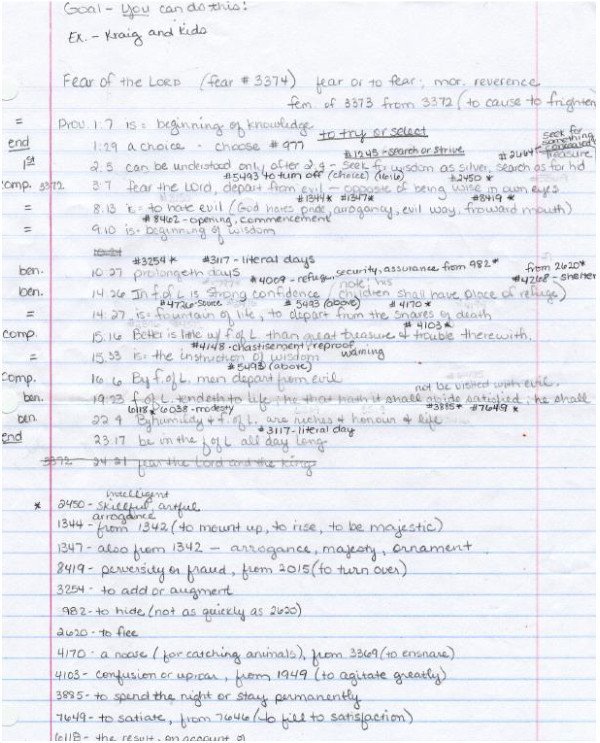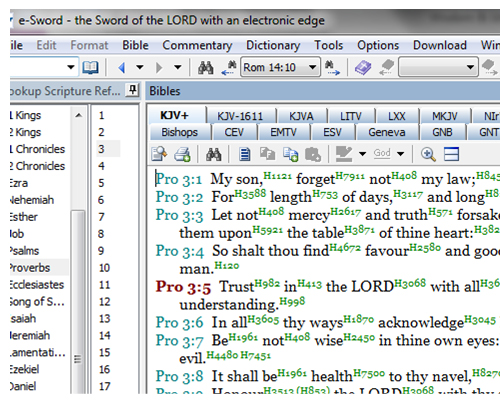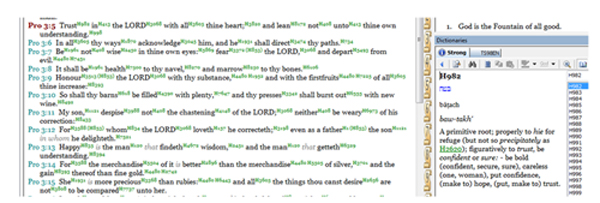As we continue our journey through the study guide of my book, Juggling Life’s Responsibilities, we find this simple question: “In Proverbs 3:5 and 6, what is God’s recipe for success?” (page 52).
Last week I received an email from a dear friend and reader, and she asked,
I just finished reading your last [blog post]. It is as usual very helpful, especially the insight into James 1:5. Where did you find out the various Greek meanings for ‘to ask’? Is there a book or an internet site where I could look up the meaning of words in Greek and Hebrew? I have found out that so much of the wisdom and correct meaning of the Bible we miss, because there is no equivalent word in English. I have a Strong’s Concordance with a Bible dictionary.
Yes! Studying out the Greek and Hebrew meanings of words is quite easy, although I long for the day when I have a personal, working grasp of both languages and don’t have to rely on a concordance. (I might be an old dog, but I’m going to keep working on that new trick!)
So I’m going to depart from my usual style of blog post and show you a simple way to study a verse. Since Proverbs 3:5-6 are familiar verses to most of us, I thought this would also be an excellent way to see something new!
Once upon a time, I used my hardbound Strong’s Concordance and a stack of notebook paper to study.

I have now graduated to the information age and use http://e-sword.net for my studying. (It’s free!)
 E-Sword comes standard with “KJV+” — a King-James version of the Bible that contains a number after each word. Numbers that start with an H are links to the Hebrew dictionary, and numbers that start with a G are links to the Greek dictionary. In a bottom corner of my screen, I can then click on the dictionary and see my Strong’s Concordance.
E-Sword comes standard with “KJV+” — a King-James version of the Bible that contains a number after each word. Numbers that start with an H are links to the Hebrew dictionary, and numbers that start with a G are links to the Greek dictionary. In a bottom corner of my screen, I can then click on the dictionary and see my Strong’s Concordance.

The dictionary allows me to see a definition for a word, and often a link to related words. One of my favorite features is the end of each entry, after the hyphen. Other ways that each Hebrew or Greek word has been translated into English are listed, so I have endless possibilities for study.
For instance, in the screen shot above, you can see the dictionary entry for H982, translated in Proverbs 3:5 as “trust.” I learn that this is a “primitive root” (and I often have to look up what that exactly means in grammatical terms). After the hyphen, I discover that H982 has also been translated into the English using words such as “be bold, careless, put confidence, or hope.” I can use E-sword’s search feature to look these up if I wish.
So if I haven’t lost you or bored you yet, let’s do a simple word study of Proverbs 3:5-6.
Trust – H982 bâṭach – A primitive root; properly to hide for refuge; figuratively to trust, be confident or sure.“Trust in the LORD with all thine heart;
and lean not unto thine own understanding.
In all thy ways acknowledge him,
and he shall direct thy paths” (Proverbs 3:5-6, KJV).
To trust in the LORD with all my heart means to hide in Him for refuge and to place all my confidence in Him.
in the LORD – H3068 yehôvâh – (the) self Existent or eternal. (Note: there are no vowels in Hebrew, so the dictionary adds vowels for us English speakers. Typing YHVH would be just as correct.)YHVH is God’s name! We would recognize it as Jehovah, since our language through time has changed Hebrew Ys to Js, plus vowels. You’ll also hear people pronounce it, much more correctly, as “Yehovah.” Some people say “Yahweh.”
But however His name is to be pronounced or spelled, this is His name! This is the name to which we are to hide and in which we are to place all our confidence.
I have been trying to get into the habit of saying “Yehovah” each time I see the all-capital “the LORD” written in my Bible. It means He is eternal, in both directions.
And Moses said unto God, Behold, when I come unto the children of Israel, and shall say unto them, The God of your fathers hath sent me unto you; and they shall say to me, What is his name? what shall I say unto them?
And God said unto Moses, I AM THAT I AM: and he said, Thus shalt thou say unto the children of Israel, I AM hath sent me unto you.
And God said moreover unto Moses, Thus shalt thou say unto the children of Israel, the LORD God of your fathers, the God of Abraham, the God of Isaac, and the God of Jacob, hath sent me unto you: this is my name for ever, and this is my memorial unto all generations” (Exodus 3:13-15, KJV).
Each word in red above is God’s name, but isn’t it hard to see in English? However, I’ve taught my children that there are eight “being” verbs in English: am, is, are, was, were, be, being, been. You can substitute each of these words into God’s name and get just the tiniest sense of the eternalness of our almighty God.
“I am”
He is
He was
He is being
He has been
Can you catch the smallest glimpse of His size? Of His grandeur? Of His might?
And He invites us to trust in Him!
It is indeed a pleasure to know His name!
With all – H3605 – kôl kôl – properly the whole; hence all, any or every.Every bit of my trust and confidence is to be placed in God.
“Some trust in chariots, and some in horses: but we will remember the name of YHVH our God” (Psalm 20:7).
Thine heart – H3820 – lêb – A form of H3824; the heart; also used (figuratively) very widely for the feelings, the will and even the intellect; likewise for the center of anything.
I don’t have time to go into “leb” or “heart” today, but I highly recommend Ruth Beechick’s excellent book on “the heart,” Heart and Mind: What the Bible Says About Learning. For the moment, though, just carry a piece of paper with you for a day and jot a list of everything your “feelings, will and even the intellect” touch. You’ll be amazed. Is all of your heart trusting in the eternal God — or are your feelings, will and intellect trusting in other things alongside Him?
And lean not – H8172 – shâ‛an – A primitive root; to support one’s self.
Unto thine own understanding – H998 – bı̂ynâh – understanding. From H995 – bı̂yn – A primitive root; to separate mentally (or distinguish), that is, (generally) understand.
We are not to support ourselves on things that we can mentally distinguish or try to separate and figure out. We only have this human, earthly body, with our five senses. As we’ve seen many times now, Eve was deceived when she relied upon her senses. We are no different! We must trust on the eternal God, whom we cannot see and cannot understand.
“Seek ye YHVH while he may be found, call ye upon him while he is near: Let the wicked forsake his way, and the unrighteous man his thoughts: and let him return unto YHVH, and he will have mercy upon him; and to our God, for he will abundantly pardon. For my thoughts are not your thoughts, neither are your ways my ways, saith YHVH. For as the heavens are higher than the earth, so are my ways higher than your ways, and my thoughts than your thoughts” (Isaiah 55:6-9, KJV).
In all thy ways – H1870 – derek – a road (as trodden); figuratively a course of life or mode of action.
The picture in my mind here is of a cattle path, a path of mud from the pasture to the milking barn, worn down from repeated travel, day after day after day. Those habits of mine, taken without thought as my “course of life,” are to acknowledge YHVH and always travel toward Him.
Acknowledge him – H3045 – yâda‛ – A primitive root; to know (properly to ascertain by seeing).
I find it interesting that I am to take the same senses with which God created me, especially my eye sight, even though it is easily deceived, and “turn my eyes upon Jesus.” Isn’t that amazing? I only have my senses, but I am not to be supported by them. (“Lean not…”) However, I am to give my body as a “living sacrifice” to my eternal God, turning everything He gave me in this body and making it my habit to focus it all on Him!
For instance,
“Now faith is the substance of things hoped for, the evidence of things not seen… Through faith we understand that the worlds were framed by the word of God, so that things which are seen were not made of things which do appear…” (Hebrews 11:1, 3, KJV).
Dear friend, take a moment this week to study further in Hebrews 11. Just count how many times it says something about what we see — or don’t see! It’s amazing…
Yet God allows us to use our eyes.
“Many have undertaken to draw up an account of the things that have been fulfilled among us, just as they were handed down to us by those who from the first were eyewitnesses and servants of the word. Therefore, since I myself have carefully investigated everything from the beginning, it seemed good also to me to write an orderly account for you, most excellent Theophilus, so that you may know the certainty of the things you have been taught” (Luke 1:1-4, NIV).
“That which was from the beginning, which we have heard, which we have seen with our eyes, which we have looked at and our hands have touched—this we proclaim concerning the Word of life. The life appeared; we have seen it and testify to it, and we proclaim to you the eternal life, which was with the Father and has appeared to us. We proclaim to you what we have seen and heard, so that you also may have fellowship with us. And our fellowship is with the Father and with his Son, Jesus Christ” (1 John 1:1-3, NIV).
Oh, may I see only Yeshua—and may I only use my eyes and senses to point others to Him!
And he shall direct – H3474 – yâshar – A primitive root; to be straight or even; figuratively to be (causatively to make) right, pleasant, prosperous.
A very precious verse to me is found in Isaiah 30:19 and 21:
“O people of Zion, who live in Jerusalem, you will weep no more. How gracious he will be when you cry for help! As soon as he hears, he will answer you… Whether you turn to the right or to the left, your ears will hear a voice behind you, saying, ‘This is the way; walk in it'” (NIV).
How badly I need the Eternal YHVH to send His Spirit, to breathe into my ears and say, “This is the way; walk in it!” Yet, as we learned last week, He invites us to come boldly before Him and ask for wisdom. He is eager to answer this request and to “direct” our paths, to make them straight and even, right, pleasant, and prosperous.
“Let us then approach the throne of grace with confidence, so that we may receive mercy and find grace to help us in our time of need” (Hebrews 4:16, NIV).
Thy paths – H734 – ‘ôrach – a well trodden road (literally or figuratively); also a caravan.
Contrast this word with the cow path I mentioned earlier. This is the interstate, “well trodden” by “caravans” of people.
Isaiah 60-66 are some of my favorite chapters of the Bible, because they have not yet completely been fulfilled. They describe how God searched for me over the entire earth, loving me and calling me by name.
(The book of Ephesians goes into this in great detail, too, how by His gracious love and mercy, He included me in His plan, sending His Son to pay for my sin, adopting me as His dear child, and filling me with His Spirit.)
But I love the caravan described at the end of Isaiah, because I live on the “distant island” of North America, and I am now counted as one of His family…
“‘I will set a sign among them, and I will send some of those who survive to the nations—to Tarshish, to the Libyans and Lydians (famous as archers), to Tubal and Greece, and to the distant islands that have not heard of my fame or seen my glory. They will proclaim my glory among the nations. And they will bring all your brothers, from all the nations, to my holy mountain in Jerusalem as an offering to the LORD—on horses, in chariots and wagons, and on mules and camels,’ says the LORD. ‘They will bring them, as the Israelites bring their grain offerings, to the temple of the LORD in ceremonially clean vessels. And I will select some of them also to be priests and Levites,’ says the LORD. ‘As the new heavens and the new earth that I make will endure before me,’ declares the LORD, ‘so will your name and descendants endure. From one New Moon to another and from one Sabbath to another, all mankind will come and bow down before me,’ says the LORD” (Isaiah 66:19-23, NIV).
Do you see the resemblance to the words of Revelation?
“Then I saw a new heaven and a new earth, for the first heaven and the first earth had passed away, and there was no longer any sea. I saw the Holy City, the new Jerusalem, coming down out of heaven from God, prepared as a bride beautifully dressed for her husband. And I heard a loud voice from the throne saying, ‘Now the dwelling of God is with men, and he will live with them. They will be his people, and God himself will be with them and be their God…’
“The great street of the city was of pure gold, like transparent glass. I did not see a temple in the city, because the Lord God Almighty and the Lamb are its temple. The city does not need the sun or the moon to shine on it, for the glory of God gives it light, and the Lamb is its lamp. The nations will walk by its light, and the kings of the earth will bring their splendor into it. On no day will its gates ever be shut, for there will be no night there. The glory and honor of the nations will be brought into it. Nothing impure will ever enter it, nor will anyone who does what is shameful or deceitful, but only those whose names are written in the Lamb’s book of life” (Revelation 21:1-3, 21-27, NIV).
These are all things I cannot see with my senses, with my own understanding. But when I acknowledge Him by faith, this is my promised end! How much more prosperous could it be? How much more love could this Eternal God lavish on me?
So I must trust in YHVH with all my heart. What a delight His commands can be!
“Trust in the LORD with all thine heart;
and lean not unto thine own understanding.
In all thy ways acknowledge him,
and he shall direct thy paths” (Proverbs 3:5-6, KJV).
![]()
I am encouraged by your post. I have studied Greek and Hebrew, but I have not pursued much as I am spposed to do. I am studying Divinity.
Thanks,
I like your links and comments. May God bless your godly and holy life!
In Christ,
Mira Ahn
This is so beautiful and true , , as well as spiritual. I would love to share this message with congregations that I share God’s Great the Good News! May have your permission to make use of this message(giving you the credit with quotes written and with my personal voice stressing greatest spirituality)
Of course, you are welcome to share. 🙂
Anne,
This is wonderful! I find there are so many differences if one looks at the Hebrew and Greek roots and also, the time/ culture anything was written. Thank you so much for sharing these wonderful insights.
Blessings in Yeshua HaMashiach!
Joycelyn
Wow! I so love you for this!!!! I stumbled across this post by doing a google search and I am so glad I did! It was a very exciting read and I can’t wait to see what other juicy treasures I’ll find here! Thanks so much!
Thank you!
Hi Miss Anne Elliot Iam so blessed with your blog doing word study is my passion too. I have some question. After you do yiur grammatical analysis where is your synthesis? Can you tell me what is the meaning of Proverbs 3:5-6 in one sentence pls as the product of your word study.